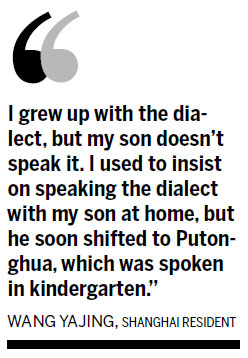Shanghai kindergartens to promote local dialect
By Wang Hongyi in Shanghai ( China Daily ) Updated: 2014-02-07 10:03:00Linguists, scholars, political advisers and residents rallied to rescue the dialect from extinction.
Political adviser Qian Cheng, who is deputy director of the Shanghai Comic Troupe, is among the group who are standing up to save their dialect.
"I have visited schools and found that many children have difficulty speaking the dialect, and many cannot speak it at all," Qian said.
Earlier this month, Qian and several other political advisers proposed that the city government should promote the dialect among children during its annual session.
"It's not merely the children who cannot speak the dialect. Even teachers were unable to speak it properly," said political adviser Wu Xiaoming, who is vice-president of the Shanghai Film Group.

In 2012, the first Shanghai dialect textbook was introduced in extracurricular classes and hobby groups.
The book, Learning to Speak the Shanghai Dialect for Pupils, teaches the dialect's usage through local folktales, rhymes, riddles and cartoons.
"This can be a fun and educational experience," said the textbook's author Qian Nairong, also the director of the Research Center of Linguistics at Shanghai University.
"Regional dialects are one of the pillars for local culture," Qian said.
Public services in Shanghai also promote the dialect.
Bus announcements are made in the dialect as well as in Putonghua and English, while Shanghai Airlines uses the dialect to announce passenger information.
The city's long-running News Workshop TV program started a Shanghai dialect version in 2012, becoming the first TV news program in China to be broadcast in the dialect.
But concerns have been raised, especially among the city's migrant population.
"I think the education authorities should consider the feelings of migrant children before implementing the program. When other children communicate in the local dialect, migrant children may feel alienated. I'm not sure whether it's good for their psychological growth," said a woman surnamed Liu.
Cheng Yuli contributed to the story.
|
|
|
|
|
|
|
|





















 Raymond Zhou:
Raymond Zhou: Pauline D Loh:
Pauline D Loh: Hot Pot
Hot Pot Eco China
Eco China China Dream
China Dream China Face
China Face





